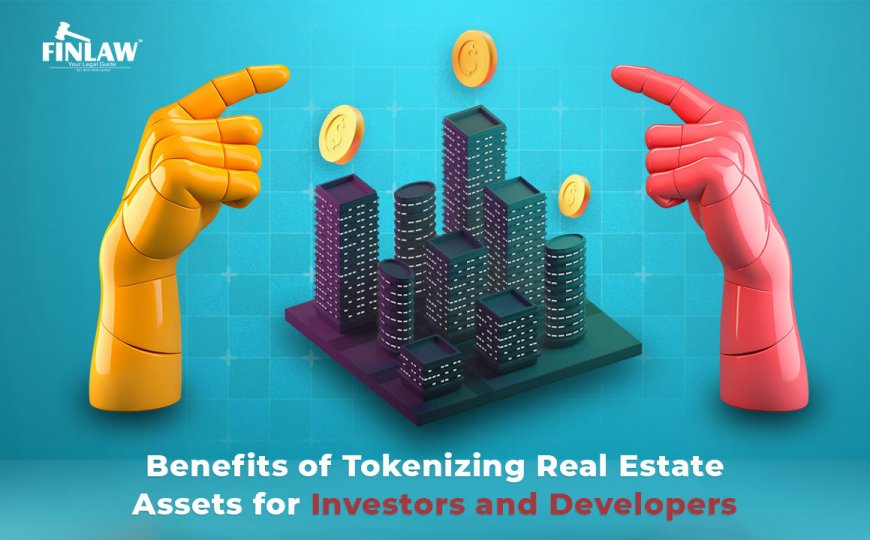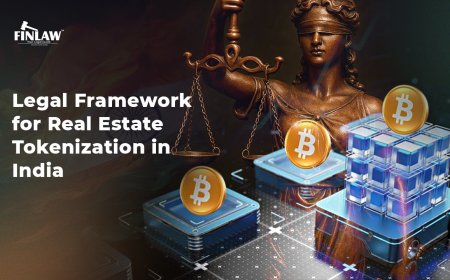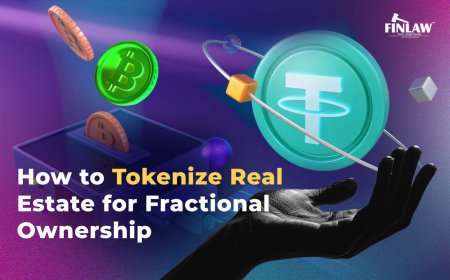Benefits of Tokenizing Real Estate Assets for Investors and Developers
Discover how tokenization of real estate assets offers liquidity, fractional ownership, and global investment opportunities in India.

The tokenization of real estate assets is revolutionizing how investors and developers access, manage, and profit from property markets. By leveraging blockchain technology, tokenization converts traditional real estate ownership into digital tokens, enabling fractional ownership, faster settlements, and global investor access. In India, while this remains a nascent market, its potential is attracting both developers and investors seeking liquidity, transparency, and innovative capital-raising methods.
What is Tokenization of Real Estate Assets?
Tokenization is the process of converting ownership rights in a property into digital tokens on a blockchain. Each token represents a fraction of the asset or its cash-flow rights. These tokens are tradable on digital platforms, making previously illiquid real estate investments accessible, transferable, and programmable. Smart contracts automate compliance, dividend distribution, and transfer restrictions, enhancing transparency and efficiency.
Why Tokenization is Gaining Momentum
Several factors are driving the adoption of tokenized real estate:
-
Blockchain Maturity: Modern blockchain infrastructure supports secure token issuance and programmable compliance.
-
Investor Demand: Fractional ownership allows small and retail investors to access high-value properties with lower capital requirements.
-
Cost Reduction: Automation via smart contracts reduces administrative burdens, intermediaries, and transaction costs.
-
Global Capital Access: Developers can reach investors worldwide, diversifying funding sources.
Benefits for Investors
1. Enhanced Liquidity
Traditional real estate is often difficult to buy or sell quickly. Tokenization creates tradable fractional units, allowing investors to liquidate portions of their holdings on digital marketplaces, significantly improving liquidity compared to conventional property investments.
2. Fractional Ownership and Accessibility
Tokenization lowers the entry barrier for investors. Instead of investing in entire properties, individuals can purchase small stakes for as little as a few thousand rupees, democratizing access to high-value real estate.
3. Faster and Cost-Effective Settlements
Tokens simplify transactions by embedding ownership rights and transfer rules into smart contracts. This reduces manual paperwork, middlemen, and settlement times, though legal compliance with Indian property laws remains necessary.
4. Transparency and Compliance
Blockchain provides an auditable ledger of transactions. Smart contracts can enforce KYC/AML compliance, lockup periods, and dividend distribution, ensuring investors have clear visibility and regulatory adherence.
5. Diversification Opportunities
Tokenization allows investors to diversify across multiple properties or projects without committing large sums to a single asset, spreading risk and potentially improving portfolio performance.
Benefits for Developers and Asset Managers
-
Broader Capital Access: Developers can attract a wider pool of domestic and international investors.
-
Simplified Investor Management: Automated distributions and on-chain records reduce administrative workload and improve reporting transparency.
-
Flexible Structuring: Developers can tokenize equity, revenue streams, or debt, creating custom investment products for different investor preferences.
Tokenization thus provides developers with an innovative way to raise funds, lower financing costs, and manage investors efficiently.
Tokenization Models
-
Equity Tokens: Represent ownership shares in the legal entity holding the property.
-
Debt Tokens: Represent loans or bonds backed by property, with scheduled interest or principal repayments.
-
Revenue Tokens: Grant rights to a portion of rental income or profits.
-
Utility Tokens: Less common; may provide usage rights rather than ownership.
The choice of model impacts regulatory compliance and investor rights, especially under Indian law.
Regulatory Landscape in India
India currently lacks a dedicated framework for tokenized real estate. If tokens are structured as securities, they may fall under SEBI regulations. Other applicable laws include:
-
FEMA: For cross-border investments.
-
RERA & Land Laws: Compliance with registration, title transfer, and stamp duty requirements.
-
Tax Regulations: Income from tokenized assets is subject to Indian taxation laws.
Platforms offering tokenized real estate in India must operate within legal boundaries and ensure KYC/AML compliance to protect investors and avoid regulatory violations.
Key Risks
-
Regulatory Classification Risk: Tokens may later be deemed securities, triggering retrospective compliance requirements.
-
Legal Enforceability: Tokens often represent contractual rights; statutory property rights still require off-chain documentation.
-
Platform & Custody Risk: Smart contract bugs or platform insolvency can affect investments.
-
Liquidity Risk: Tradable tokens do not guarantee immediate secondary market liquidity.
Investors and developers must perform due diligence to mitigate these risks.
Due Diligence Checklist for India
For Investors:
-
Confirm the legal nature of the token (equity, debt, revenue).
-
Verify platform authorization and KYC/AML compliance.
-
Review off-chain legal documents (title, deeds, encumbrance certificates).
-
Understand exit options and secondary market availability.
-
Check fees, distribution policies, and dispute resolution mechanisms.
For Developers:
-
Obtain a legal opinion mapping token rights to Indian law.
-
Implement KYC/AML and investor eligibility controls.
-
Integrate on-chain records with off-chain property registries and tax compliance.
-
Use audited smart contracts and proven token issuance platforms.
Global Examples
International platforms such as RealT (U.S. rental properties) and Tokeny (tokenization infrastructure) demonstrate how tokenization can create liquidity and global investor access. Most projects pair on-chain tokens with traditional legal structures, highlighting the importance of enforceable off-chain rights.
Future Outlook in India
The adoption of tokenization in India depends on regulatory clarity and the development of compliant platforms. Tokenized real estate may grow through structures aligned with existing regulations, such as REIT-like offerings or securitized debt. As investor confidence and regulatory guidance improve, tokenization could become a mainstream method for property investment.
Conclusion
The tokenization of real estate assets presents exciting opportunities for both investors and developers:
-
Investors gain liquidity, diversification, and fractional ownership.
-
Developers benefit from broader capital access, streamlined investor management, and innovative funding structures.
However, careful legal structuring, regulatory compliance, and platform due diligence are critical for success, especially in India. By understanding the benefits, risks, and best practices, stakeholders can leverage tokenization to unlock a more efficient, transparent, and inclusive real estate market.
What's Your Reaction?



















